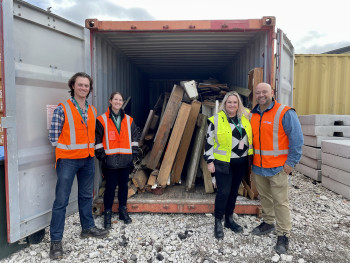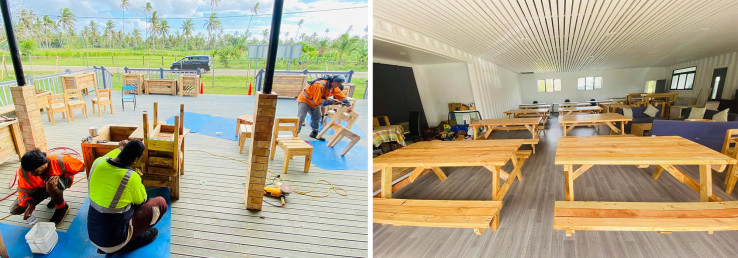Building opportunity through waste
6 December 2022
Timber from old public houses is being used to create new furniture and assist with skills training in Tonga.
Construction and demolition waste is a big contributor to landfill. Estimates suggest it accounts for around half of all waste sent to landfill in New Zealand.
Kāinga Ora, alongside industry partners, aims to help tackle this issue by putting in place more sustainable site clearance methods when removing houses from development sites.
This includes prioritising house relocation and deconstruction, over demolition, wherever possible. Deconstruction is a way of breaking down building materials with a focus on reusing and recycling as many materials as possible.

Kāinga Ora waste minimisation and site clearance team members with Saia Latu, TROW Group general manager, alongside materials going to Tonga.
Ensuring there is a market for reused materials can be challenging, but deconstruction contractor TROW Group has come up with an innovative solution. Materials from Kāinga Ora homes, and other projects, are shipped to Tonga to be repurposed, donated and assist with skills training.
TROW Group General Manager Saia Latu, originally from Tonga, came up with the idea around the time he first started working with Kāinga Ora in 2019.
From two large Kāinga Ora deconstruction projects in Auckland, Saia sent 13 shipping containers of appliances, timber and furniture to Tonga to help with the rebuild efforts following Cyclone Gita.
Three years on, TROW Group still sends furniture and materials from Kāinga Ora houses, and other projects, to its Tongan division in Tongatapu. They now also have a workshop and distribution centre where students from Tupou Tertiary Institute (TTI) and local schools can gain hands on carpentry experience.
The students make a range of products using salvaged timber. These include picnic tables, coffee tables, desks, bar stools, planter boxes, children’s tables and chairs, framing for building extensions, and more. The wares are sold in the community and on Facebook at Tonga Auction House(external link) at affordable prices.

Tongan carpentry students make quality furniture using timber from old Kāinga Ora houses.
Waste minimisation and site clearance manager Rachel Trinder says the benefits of this approach are two-fold. “Not only are we seeing good materials from old state homes being reused, but the same materials also help provide people with the ability to learn new skills.
“We hope to see more initiatives like this, as well as the creation of more local solutions, as the deconstruction sector matures.”
TROW Group General Manager Saia Latu plans to keep growing the business, with ambitions to create flat pack furniture and modular housing in Tonga using pre-used building materials from Kāinga Ora homes.
“Where most people see building waste, we see opportunity,” Saia says. “It’s about creating a genuine circular economy.
“We want to help show that there is value in these materials and that deconstruction is a viable business.”
Recent results
Kāinga Ora aims to reuse or recycle at least 80% of uncontaminated materials from Auckland and Northland development sites, and 60% from all other regions. In addition, we plan to relocate at least 7% of public houses from development areas nationally.
In financial year 2022, we exceeded our targets with 87% of uncontaminated materials reused or recycled in Auckland and 10% of houses relocated from development areas across the country.
In all other regions, materials reuse and recycling from our deconstruction and demolition programmes is being tracked from financial year 2023 onwards.
